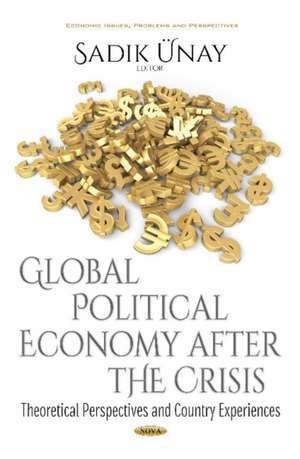Global Political Economy After the Crisis: Theoretical Perspectives & Country Experiences
Editat de Sadik nayen Limba Engleză Hardback – 28 sep 2017
Preț: 1443.86 lei
Preț vechi: 1852.85 lei
-22% Nou
Puncte Express: 2166
Preț estimativ în valută:
276.32€ • 287.41$ • 228.12£
276.32€ • 287.41$ • 228.12£
Carte disponibilă
Livrare economică 24 martie-07 aprilie
Preluare comenzi: 021 569.72.76
Specificații
ISBN-13: 9781536122909
ISBN-10: 1536122904
Pagini: 330
Dimensiuni: 180 x 260 x 22 mm
Greutate: 0.73 kg
Editura: Nova Science Publishers Inc
Colecția Nova Science Publishers Inc
ISBN-10: 1536122904
Pagini: 330
Dimensiuni: 180 x 260 x 22 mm
Greutate: 0.73 kg
Editura: Nova Science Publishers Inc
Colecția Nova Science Publishers Inc
Cuprins
Introduction; Multipolarity & the BRICS: Global Power Shift Arguments in Perspective; New Perspectives on Central Banking in the Post-Crisis Era; Whither Developmental State in East Asia; Can "Make in India" Make It? The Case for a Stronger Manufacturing Base for Sustainable Growth; Brazilian Economic Policy in the Aftermath of the Global Financial Crisis; Cuba: A Unique Player in the World Economy; Disruptive Force, Indispensable Partner, or Arch Rival? Perceptive Changes in Chinas Global Role; A Beijing Consensus in the Making: The Rise of Chinese Initiatives in the International Political Economy & Implications for Developing Countries; Macroeconomic Adjustment in Asia after the Global Financial Crisis: Japan, Korea, & China; Energy Security & Future of the Persian Gulf; The Role of G20 in Shaping the Global Financial Architecture; Global Governance, Middle Powers & the G20: The Case of the Turkish Presidency; Changing Politics of the Global Trade Regime: EU-Turkey Trade Relations in Context; Evaluating Shanghais Potential as a Global Financial Center; Gold Reserves Held by Central Banks: A Comparison of Advanced & Emerging Economies; Index.
